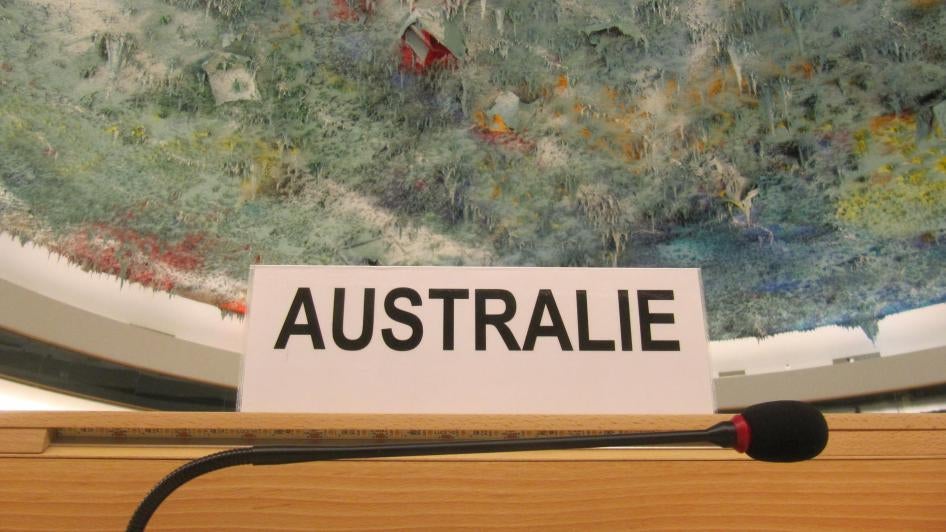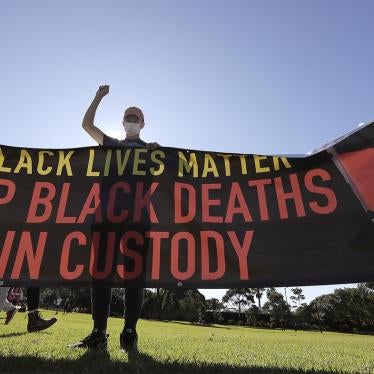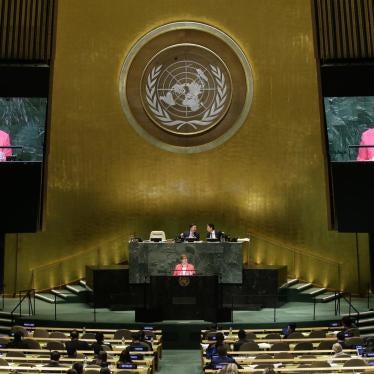(Geneva) – The Australian government should seriously address the criticisms of its human rights record and scores of recommendations raised by United Nations member countries, Human Rights Watch said today. Australia appeared before the UN Human Rights Council for its Universal Periodic Review (UPR) in Geneva on January 20, 2021.
“UN member countries rightly criticized Australia’s treatment of asylum seekers and questioned why incarceration rates of First Nations peoples remain so high,” said Elaine Pearson, Australia director at Human Rights Watch. “The UN review made it clear that the Australian government hasn’t followed through on some of its key past pledges to the UN Human Rights Council.”
The Universal Periodic Review, begun in 2006, is a comprehensive review of the human rights record of each UN member state conducted every five years. The country under UN review, along with local and international organizations, has the opportunity to contribute reports to inform the review process. Human Rights Watch submitted an assessment of Australia’s record in July.
At the review, countries praised Australia for passing its marriage equality law, and the ratification of the Optional Protocol to the Convention against Torture (OPCAT), since the last review in 2015. Australia informed this year’s review that it had carried out in full or in part 183 out of 290 recommendations from its 2015 review.
However, more than 40 nations questioned Australia’s policies toward asylum seekers and refugees, from Brazil to Germany, South Korea to the US. Among the concerns raised was Australia’s continued use of offshore processing and prolonged detention for asylum seekers. Some countries said that Australia should place a time limit on immigration detention and provide regular judicial review.
Australian officials reiterated their longstanding support for “strong border protection” policies, including offshore processing.
“It’s disappointing to see the Australian government doubling down on policies that have caused immense harm to asylum seekers and have been repeatedly condemned by UN officials and other governments,” Pearson said. “While Australia has abandoned its responsibilities towards these people, it’s good to see the rest of the world has not.”
Several countries raised Australia’s continued failure to reduce the significant over-representation of Indigenous Australians in the criminal justice system. Aboriginal and Torres Strait Islander people comprise 29 percent of Australia’s adult prison population, but just 3 percent of the national population.
Other concerns raised included the severe inequality experienced by Australia’s First Nations people, and the lack of legal safeguards to protect the rights of journalists, whistleblowers, lawyers, activists, and others making disclosures in the public interest.
Twenty-seven countries urged Australia to raise the minimum age of criminal responsibility, currently 10 years old, a policy that disproportionately affects Indigenous children. The UN Committee on the Rights of the Child recommends that countries increase their minimum age of criminal responsibility to at least 14.
Australian officials acknowledged that the age of criminal responsibility had been considered but said criminal justice issues were not a federal responsibility but a matter for Australian states and territories. However, under international law, federal governments remain responsible for human rights violations committed at the local level.
“The Australian federal government should show leadership by working with its states and territories to change their laws to raise the age of criminal responsibility and comply with international standards,” Pearson said.









